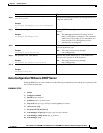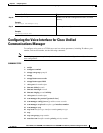
CHAPTER
4-1
Cisco VG202, Cisco VG202XM, Cisco VG204, and Cisco VG204XM Voice Gateways Software Configuration Guide
OL-16191-01
4
Configuring Voice
This chapter explains how to configure voice interfaces and ports, which convert telephone voice signals
for transmission over an IP network.
This chapter presents the following major topics:
• Prerequisites, page 4-1
• Configuring the Voice Interface, page 4-1
VoIP enables your Cisco VG202, Cisco VG202XM, Cisco VG204, and Cisco VG204XM voice gateways
to carry live voice traffic (for example, telephone calls and faxes) over an IP network. VoIP offers the
following benefits:
• Toll bypass
• Unified voice and data trunking
• Plain old telephone service (POTS)–Internet telephony gateways
For more information on understanding and configuring VoIP, see Configuring Voice over IP.
Prerequisites
Before you can configure your Cisco voice gateway to use VoIP, you must first do the following:
• Establish a working IP network.
• Implement a dial plan, including the following tasks:
–
Complete your company’s dial plan. That is, decide what patterns of dialed numbers will access
what telephony endpoints.
–
Establish a working telephony network based on your company’s dial plan.
–
Integrate your dial plan and telephony network into your existing IP network topology.
Configuring the Voice Interface
Whenever you install a new interface or want to change the configuration of an existing interface, you
must configure the interface.


















